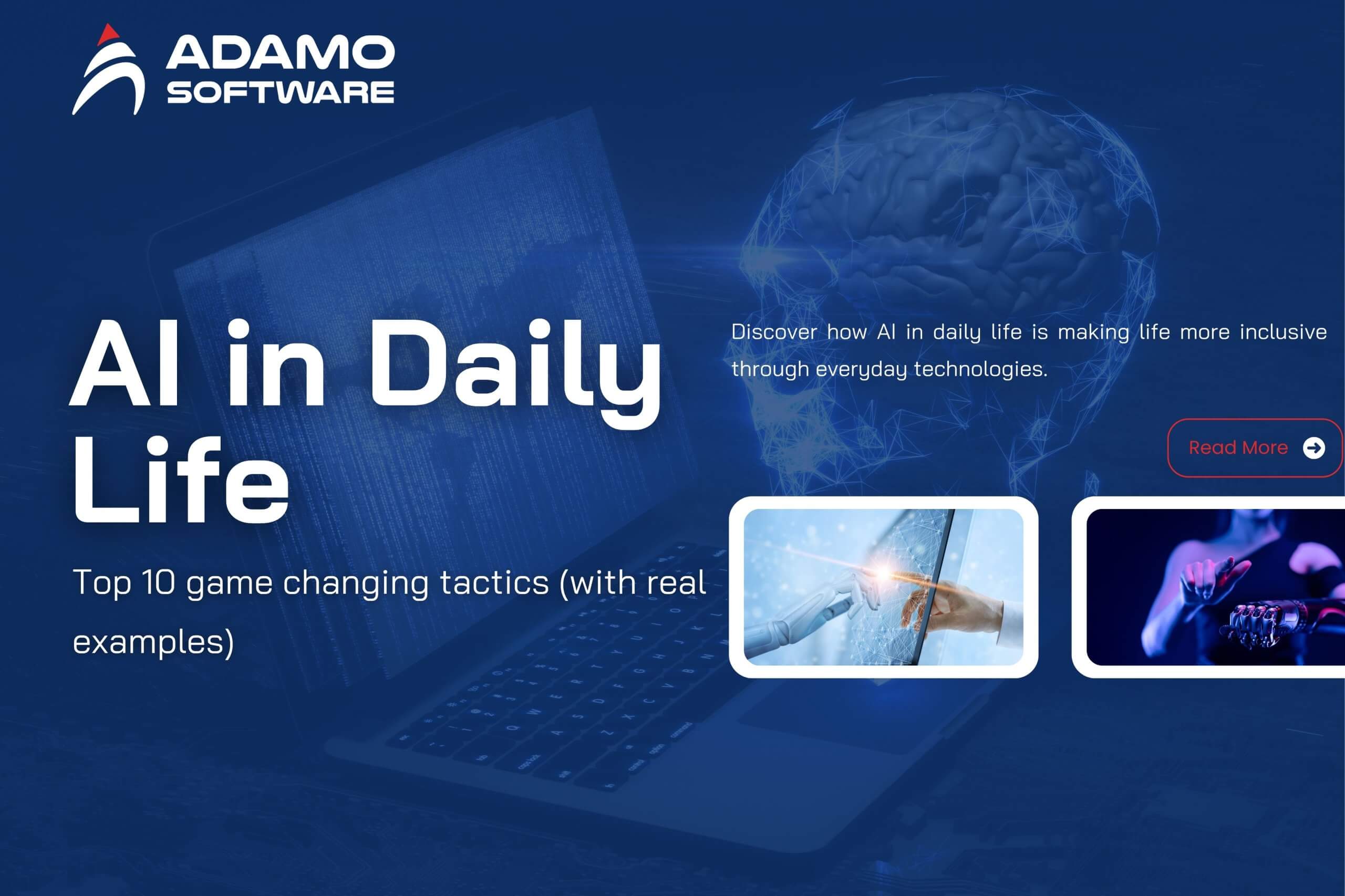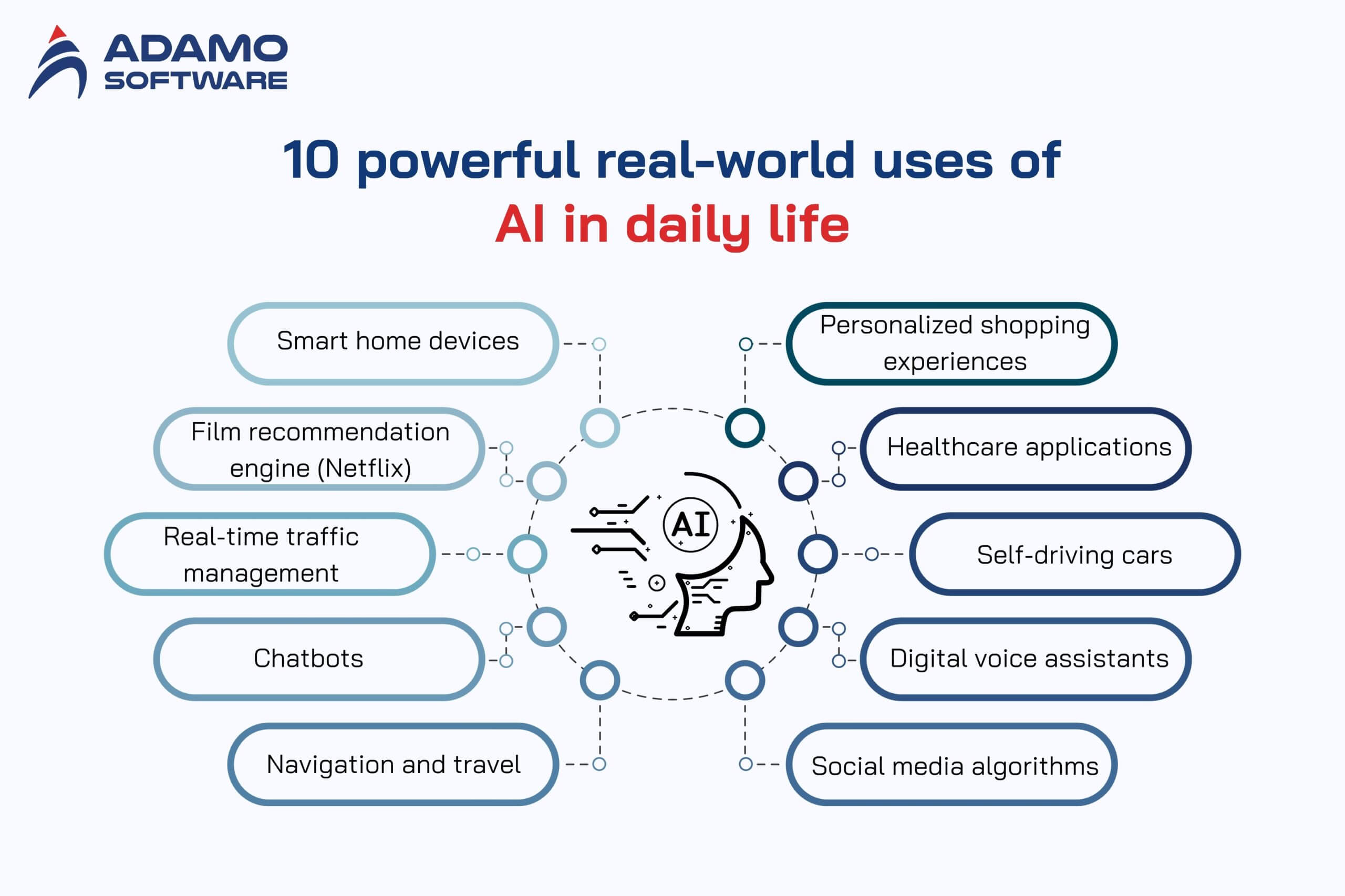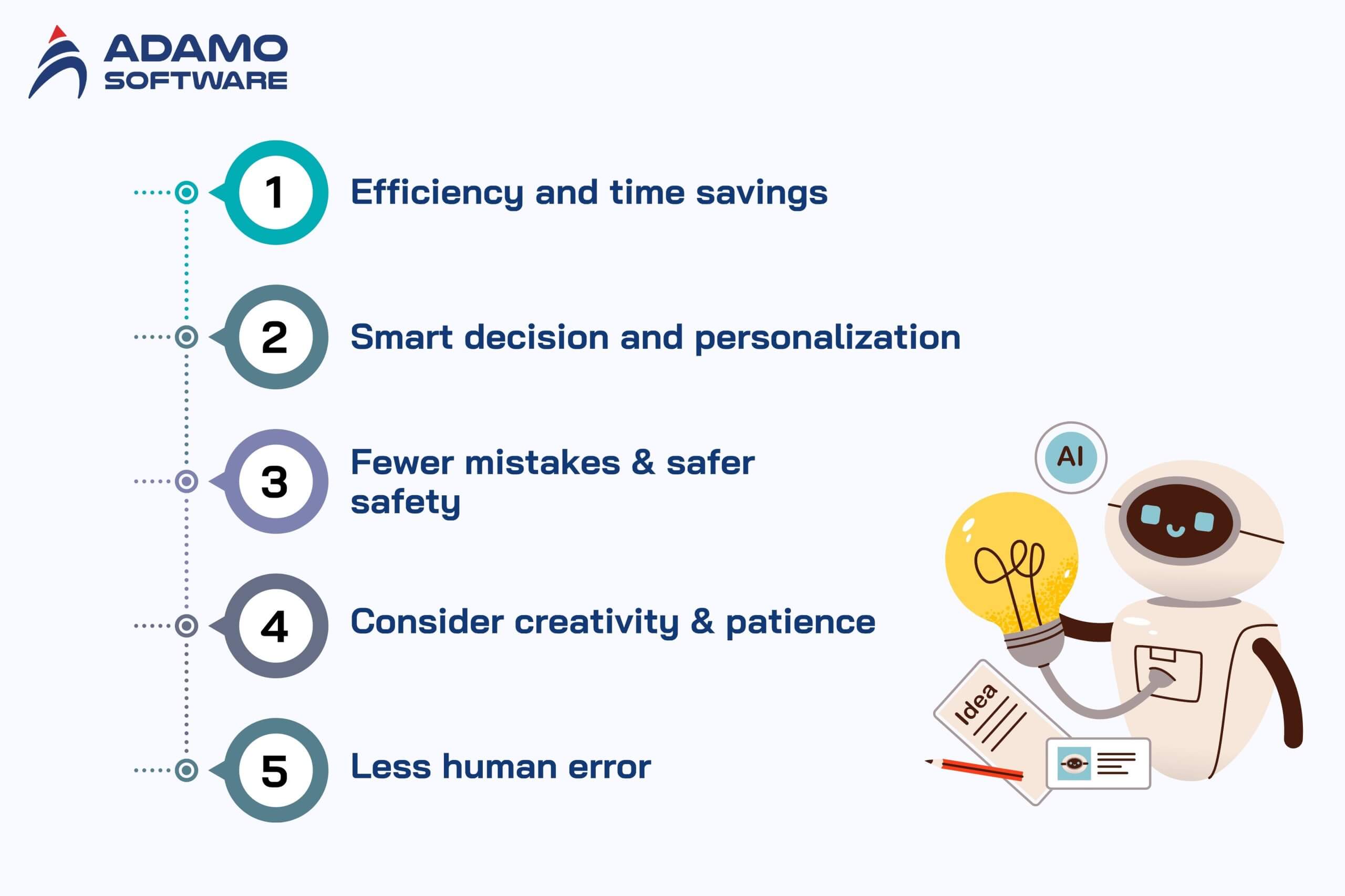Top 10 game-changing tactics of AI in daily life (with real examples)

Discover how AI in daily life is saving time, boosting safety, and making life more inclusive through everyday technologies like Alexa, fitness apps, and smart devices.
Nowadays, artificial intelligence (AI) has already become an integral part of our everyday lives. Whether it is the manner in which we shop or even how we navigate around, AI is quietly working in the background to make things quicker, simpler, and smarter.
Examples of AI in daily life are the tools we enjoy, such as voice assistants, smart home applications, and personalized apps. With AI, we make better decisions and save more time. It provides us with convenience in ways that we might not even realize.
In this article, we will discuss the impact of AI on daily life and on shaping the world. We will examine the situation today, its numerous advantages, and 10 strong real-life examples. Finally, we will learn how enterprises can realize further value with AI development services. AI in daily life is a commodity that you may or may not be apprehensive of, but it exists, and it’s expanding rapidly.
I. The Evolving Role of AI in Daily Life Today
Artificial intelligence in everyday life is swiftly increasing and becoming more innovative and productive. ChatGPT and DALL·E assist in the creation of articles or the generation of images. They transform the way people work, solve problems, and express themselves. Meanwhile, artificial intelligence (AI) is integrated into everyday technologies. They include chatbots, autonomous vehicles, and online protection systems, among others, demonstrating the benefits in most fields.
AI makes several business activities more convenient. It supports customer service departments with chatbots around the clock. It analyzes vast amounts of information at a fast pace and provides meaningful conclusions. It also assists in automating the daily tasks with real-time adjustable smart systems. These changes are more efficient and quicker at work.
Today, using edge computing, AI may operate in a more secure and faster way. AI will be kept near the place where data is gathered on phones or smart home devices. Businesses can now do it with the help of non-code platforms without knowledge of how to create AI tools. The changes indicate that AI becomes accessible to all people, not only professionals and large corporations. For businesses ready to act on this shift, Top AI Solution Providers: A guide to identify the best fit is a practical starting point for finding the right partner to bring AI into your operations.
II. What are the benefits of using AI in everyday life?
AI is still enhancing the way we live, work and relate. The usefulness of AI in everyday life is increasing more and more with various uses, including time-saving, and enhanced creativity. Such advantages are not only technical, but they are realistic and personal. How does it help? Let us find out.
1. Efficiency and time savings
AI is time-saving since it automates monotonous duties. In 2023, GitHub Copilot enabled developers to write 56 percent faster. In general, 75 percent of employees claimed that AI tools helped them become more productive. This demonstrates how AI in everyday life simplifies everyday activities and accelerates them.
2. Smart decision and personalization
AI assists individuals and businesses in making improved decisions. Roughly two out of every three consumers have more trust in the companies offering a personalized experience that is based on the application of AI. That is why the applicability of AI in everyday life is more touchy-feely-based, including shopping or streaming.
3. Fewer mistakes and safer safety
AI minimizes the problem of human error in most crucial sectors. In healthcare, there are more than 200 medical instruments that are now cleared by the FDA and which are AI-powered. It demonstrates the effect of AI in everyday life in terms of accuracy and safety in decision-making.
According to the World Economic Forum, AI has the potential to enhance accuracy in decision-making, particularly in such spheres as finance, healthcare, and logistics. This demonstrates the strength of AI in daily life in enhancing dependability in our day-to-day systems.
4. Considered creativity and patience
Design is now complemented by AI tools, in writing, and as an editor. A third of the professionals employ AI in creativity. What it implies is that the use of AI in everyday life is not devoted to logic only because it makes dealing with ideas much faster and more convenient.
The effects of AI in everyday life include saving time, enhancing health, and creativity, among others. They are practical and far-reaching. It makes us more productive, safer and more creative. The more AI develops, the more it is needed in our daily routine.
5, Less human error
Patterns and data guide AI systems. Therefore, they are less prone to mistakes than humans in most tasks. Indicatively, in factories, AI-powered robots decrease the mistakes associated with product assembly.
There are numerous advantages to AI in everyday life. It conserves time, augments comfort, amplifies safety, and provides customized services. It enhances healthier living, education, and access. Whether it is going home to work or so on, AI in daily life makes people live smarter, faster, and safer. And as technology expands, so will its advantages to all spheres of our life.
It enhances healthier living, education, and access. Whether it is going home to work or so on, AI in daily life makes people live smarter, faster, and safer. And as technology expands, so will its advantages to all spheres of our life.
III. 10 Powerful Real-World Uses of AI in Daily Life
AI has been integrated into our everyday lives, and most of the time, we are not aware of its silent work in the background. AI simplifies our daily routines by suggesting a film or helping us navigate through traffic, among other things. So, what are the 10 best real-life applications of AI in our everyday lives? Let us find out in this section. These are some examples of how integrated AI is in our homes, travel, health, and entertainment.

1. Smart Home Devices
One of the most apparent ways AI is used in daily life is in smart home devices. Devices like Google Nest and Amazon Alexa can adjust lighting, regulate temperature, and even suggest daily routines. They get to know your habits and make life more comfortable and energy-saving.
Statista reveals that in 2021, there were more than 300 million smart homes worldwide, and this figure will reach 478 million by 2025.
These appliances apply AI to minimize energy consumption and boost convenience. This is the reason why they are present in several contemporary homes.
2. Film Recommendation Engine (Netflix)
When you see a film on Netflix and it suggests one that you may enjoy based on the one you are watching, that is AI in daily life at work. Netflix applies AI to watch history and recommends it based on your taste.
According to Forbes, the AI-based recommendation system helps Netflix save more than 1 billion annually. Such a system makes users active and contented, and this is the essence of Netflix’s success.
3. Real-Time Traffic Management
AI in daily life helps traffic applications, such as Google Maps and Waze, to study the traffic situation, identify traffic jams, and offer alternative, more relevant routes. Such systems operate in real time using millions of data points.
According to the INRIX Global Traffic Scorecard, drivers in cities with AI-based solutions can save up to 73 hours (about 6 days) annually that otherwise would be wasted in congestion.
That’s one way AI helps people save both time and energy in their daily routines.
4. Chatbots
Several sites now have chatbots that appear and ask for assistance. Such bots apply AI in daily life to respond to questions, resolve problems, or navigate users without human help.
Juniper Research also predicts that chatbots will assist companies in saving more than $11 billion annually by 2025. This is due to quicker response time and lower expenditure on staff.
Chatbots enhance customer service and are accessible at all times. Therefore, an asset to most business establishments.
5. Navigation and Travel
AI assists individuals in navigation in real-time based on live maps, public transportation information, and travel recommendations. AI is used in apps, such as Google Maps, to estimate traffic, delays, and arrival time.
Navigation AI also assists in eco-friendly routing decisions and enhanced travel planning. This turns AI in our everyday life into a major component of urban mobility and trip planning.
6. Personalized Shopping Experiences
AI in daily life is utilized by online shops that customize what their clients view. When you purchase an item online, you will receive suggestions on similar products that might appeal to you, depending on your tastes and search records.
McKinsey reported that AI-based personalization yields up to a 20 percent increase in customer satisfaction and a 15 percent growth in sales in businesses applying it.
AI assists shoppers in locating their desired products in the least amount of time. It assists businesses in boosting their sales.
7. Healthcare Applications
In healthcare, AI is applied in everyday life to diagnose problems quicker and more accurately, suggest treatments, and monitor health. AI assistance is utilized to analyze X-rays, MRI scans, and patients’ records.
Statista report estimates the global AI healthcare market to be worth $187 billion by 2030. This demonstrates the immense role that AI is playing in transforming care and saving lives.
Explore Our Tailor-made Software Development Solutions
We are confident in providing end-to-end software development services from fully-functioned prototype to design, MVP development and deployment.
8. Self-Driving Cars
An enhanced level of AI in everyday life is self-driving cars. Tesla and Waymo are among the firms that rely on AI to identify traffic lights, objects, and roads.
These cars are still in the testing phase. However, they make real-time decisions using sensors and deep learning. The National Highway Traffic Safety Administration (NHTSA) reports that 94 percent of serious accidents are caused by human error. This may be prevented with the help of self-driving AI.
9. Digital Voice Assistants
Voice assistants like Siri, Alexa, and Google Assistant are common examples of how AI is used in everyday life. They assist users in alarm setups, playing music, answering questions, and smart device control.
Statista reveals that in 2020, more than 4.2 billion digital voice assistants were utilized worldwide. This figure is projected to surpass 8.4 billion in 2024. Their increased existence is a testimony to the significance of AI in day-to-day activities.
10. Social Media Algorithms
The AI in daily life refers to social media applications such as Facebook, Instagram, and TikTok, which choose what to show you. These algorithms examine your likes, comments, and the time spent on posts.
This artificial intelligence keeps the user glued to the screen. However, it also influences what people read and what they believe in. According to Pew Research, 53 percent of adult people in the U.S. say that they frequently or occasionally receive the news through social media. AI in social media assists in linking users with the content, but it is also a part of the opinion formation process.
These 10 uses reveal how much AI in daily life is interwoven into our everyday lives. AI can help you whether you are watching a movie, driving to work, shopping online, or checking your health. It simplifies, accelerates, secures, and individualizes life. AI in everyday life is transforming the way that we live and making it better. Whether we’re talking about smart homes and smart cars, healthcare, or entertainment. With the rise in technology, the use of AI in our everyday life will get even more prevalent, and our daily chores will get smarter and more efficient.
IV. Explore the full potential of AI with Adamo Software’s AI Development Services
We develop useful and responsible AI applications that assist humans in the real world at Adamo Software. Whether it is healthcare or e-commerce, we create tailor-made tools. We assist companies in bringing the power of AI into everyday life for their consumers. Having more than 250 successful software projects and 150+ experienced developers, we can help your business keep pace with the digital world.

We design AI systems that think and learn and respond in real time. If you require a chatbot, a voice assistant, a personal shopping assistant, or any other intelligent machine, we can implement your ideas into workable solutions. Our group has been working on developing AI-enabled applications that are utilized by thousands of users daily. This will aid in placing the benefits of AI in daily life right at the doors of your customers.
Adamo Software is a quality, fast, and supported software company with offices in Hanoi and clients from 15+ countries. We develop AI and assist you in applying it to real tasks. And when you are ready to discover all the worth of our AI development service, we will be glad to make it together.
FAQs
1. Will AI take over human jobs, or is it dangerous?
No, AI is a tool. Admittedly, AI will automate some jobs. However, it also provides new workplaces and makes people work more effectively. The World Economic Forum forecasts that by 2025, AI will create 97 million new jobs while transforming 85 million roles across the globe.
Repetitive work can be taken over by AI to free people to do inventive and meaningful work. Workers can spend time resolving issues or consulting with customers, as opposed to sorting data manually. Artificial intelligence in everyday life is not here to take over humanity but to aid it and enhance productivity.
We create AI tools that collaborate with people rather than compete with them at Adamo. The future, to us, lies in human-AI collaboration, and that is where the real innovation in AI in everyday life takes place.
2. Is AI going to gain importance in the future?
Yes, and it is doing so. AI has found its way to smartphones, hospitals, smart homes, and even farming. According to a report by PwC, AI has the potential to contribute $15.7 trillion to the global economy by 2030. This is an indication of how useful and common AI is in everyday life.
In Adamo Software, we observe that AI is expanding yearly. An increasing number of companies are requesting AI tools that are capable of thinking, learning, and improving. Whether it’s voice assistants or health applications, we help our partners introduce more intelligent solutions into daily life.
It is why we invest in AI development that is ready for the future. We are not the followers of the trends – we are the changers of the future of AI in everyday life, one solution at a time.






